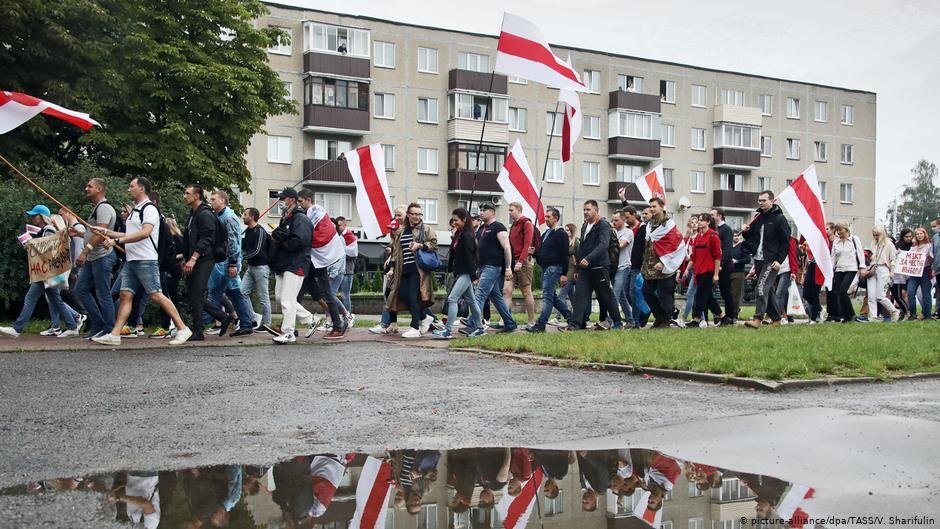Belarus v. The E.U.: What Lukashenko’s renewed regime means for the people of Belarus and the European Union as a whole
Belarus, was originally formed by Slavic and Scandinavian tribes as Kievan Rus in 862 BCE, and more recently known as ‘white Russia’, while under Soviet rule, before its independence in 1990. However, in recent years Belarus has not lived up to their ancestor’s warrior-like standards, which has led to a country in chaos. This is after the independent party, led by Sviatlana Tsikhanouskaya, led the race by the start of the polling in early August 2020. Nonetheless, she still only received twenty percent of the vote, which led to protests with the suspicion that President Alexander Lukashenko had rigged the election once again. Lukashenko had constantly been under the microscope since his election in 1994, with constant suspicion of him rigging election. Tsikhanouskaya’s independent party had given him the closest scare he’d had since his election, but he was determined none of them had a chance to challenge him again. This led to an exodus of supporters of Tsikhanouskaya and Tsikhanouskaya herself, who fled to the neighboring country of Lithuania. While other supporters may have also gone to neighboring countries such as Latvia, Poland, and some even made the long trek to Germany.
The exodus of Tsikhanouskaya’s supporters has been continuing since last August, with several government security forces now stepping up their attempts to crack down on protesters of Lukashenko. Raids were carried out as recently as July, with people such as activists, journalists, and workers of non-profit organizations, accused of organizing riots and protests against the government. Olympic athlete, Krystsina Tsimanouskaya was so disgusted at his treatment of her fellow countrymen that she had a dispute with her coaches and higher-ups that eventually led to her being sent back from Tokyo. This prompted a whole new wave of sanctions on Belarus from the EU.
Tensions are so high between Belarus and its neighbors that the chief editor of one of the leading news organizations, Irina Levshyna, was detained in Kyiv, Ukraine. This was after police had raided the workplace of the Belarusian news organization, BelaPAN. Ukrainian authorities were unable to contact Levshyna, however, later she and two colleagues were detained on suspicion of organizing and participating in actions that violate public order. The state investigative committee then came out and said that after a tax audit it was discovered that there had been several violations of the Belarusian tax law. This led to speculation that BelaPAN, who have declined to comment to news sources such as Reuters on the incident, were or are continuing to work with the Belarusian government. However, it seems as though in Belarus, as a journalist you’re either with or against the government. Journalists against Lukashenko usually end up in prison with the journalists’ association saying at least thirty journalists are currently in jail and around fifty separate criminal investigations are going on against members of the media.
Increasing tensions have also caused the Polish government to send 900 soldiers to their border with Belarus to help the already several hundred soldiers already stationed at their border along with extending the barbed wire fence on the border. Slovenia, the current holder of the bloc’s rotating presidency, said in a statement that, “This is unacceptable and amounts to a direct attack aimed at destabilizing and pressurizing the EU.” The statement continued saying that the EU nations were, “determined to take all necessary measures to effectively protect all the EU external borders, by counteracting Belarus’ aggression.” To try and help ease tensions in her final visit to Russia, German chancellor, Angela Merkel, brought the issue of Belarus to the attention of Russian president, Vladimir Putin. Belarus heavily relies on Russian energy supplies to keep its economy up and running. With all loans for their energy going through the higher-ups in Russia’s government. Unfortunately, there has been no immediate response to Merkel’s plea with Putin seemingly ignoring her, with rumors circulating that he could even be lining up to provide Lukashenko with troops to help protect his government from a possible coup. The U.S. has also tried its hand in helping ease the political restrictions in Belarus and trying to help expand its marketing economy. By strengthening the private sector they hoped it would give the general public more opportunities than they were getting under Lukashenko. Sadly, it was pretty clear the U.S.’s intentions lay elsewhere so the operation was shut down very quickly because it was making so little progress.
Many strategies have been tried to halt the reinvigoration of the Lukashenko regime. From the EU threatening more and more sanctions to Angela Merkel’s peaceful but in the end fruitless plea to Vladimir Putin, it seems as though nothing is stopping Lukashenko. So, where does that leave everyone else involved? How much longer can the immigration police hold up the progress of immigrants from Belarus? Will Russia finally align with the EU’s visions? How much more can the people of Belarus stay supportive of their tyrant leader? And how much further does the EU need to be pushed to make a concrete effort to fix Belarus? The only thing that seems certain in this situation is that if Lukashenko stays in charge Belarus will continue to be driven further and further away from the street of progress and more into their dark past where they may never find a way out.
By Luke Birch

